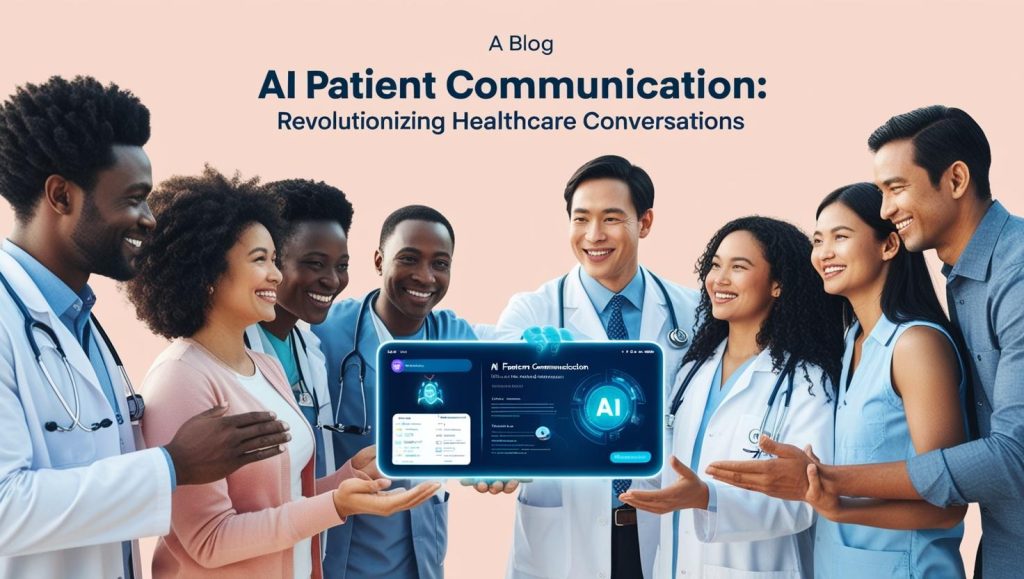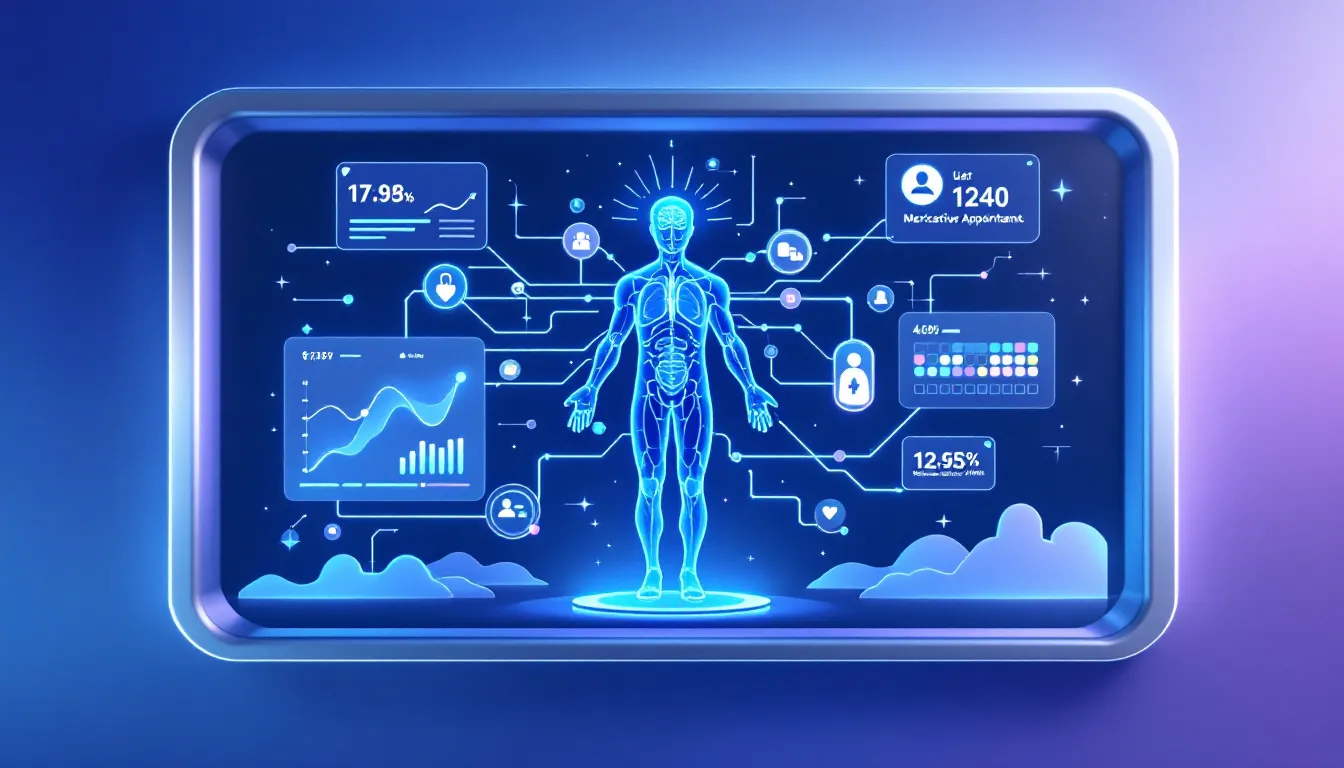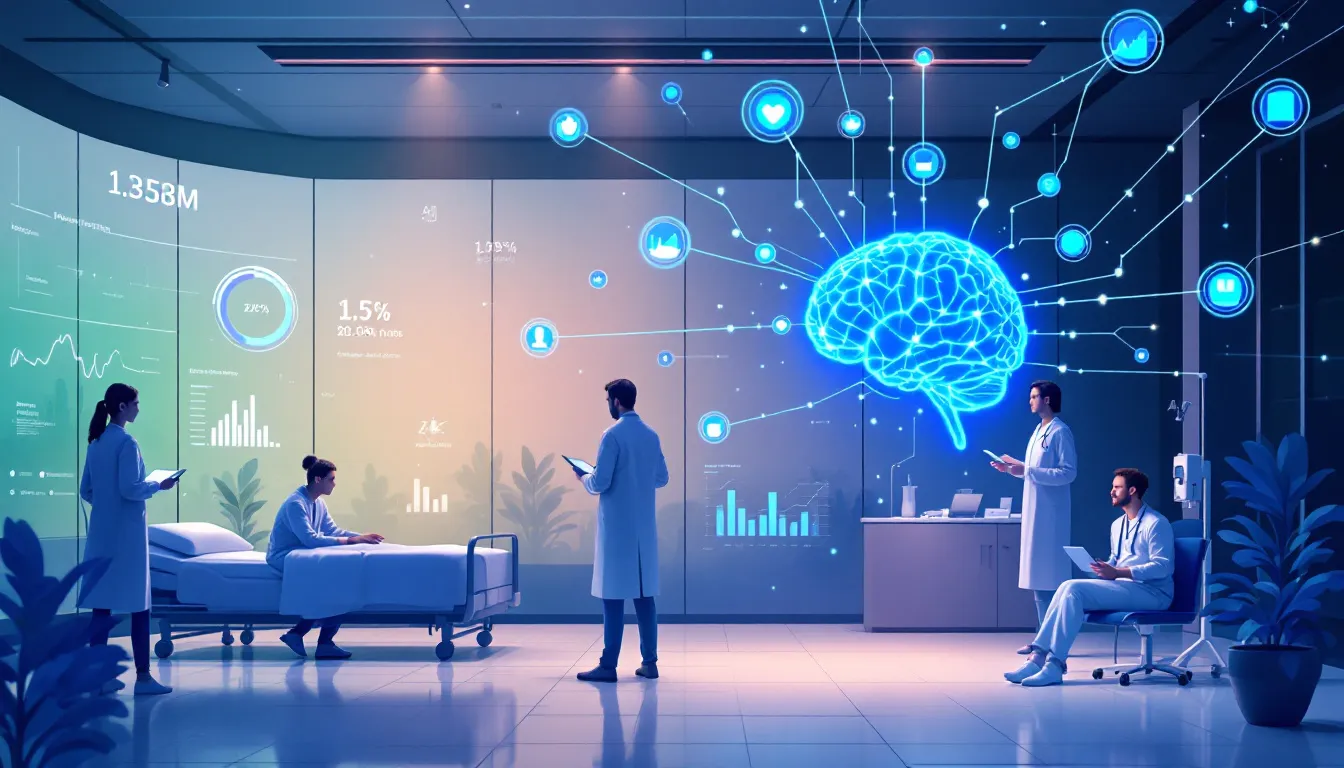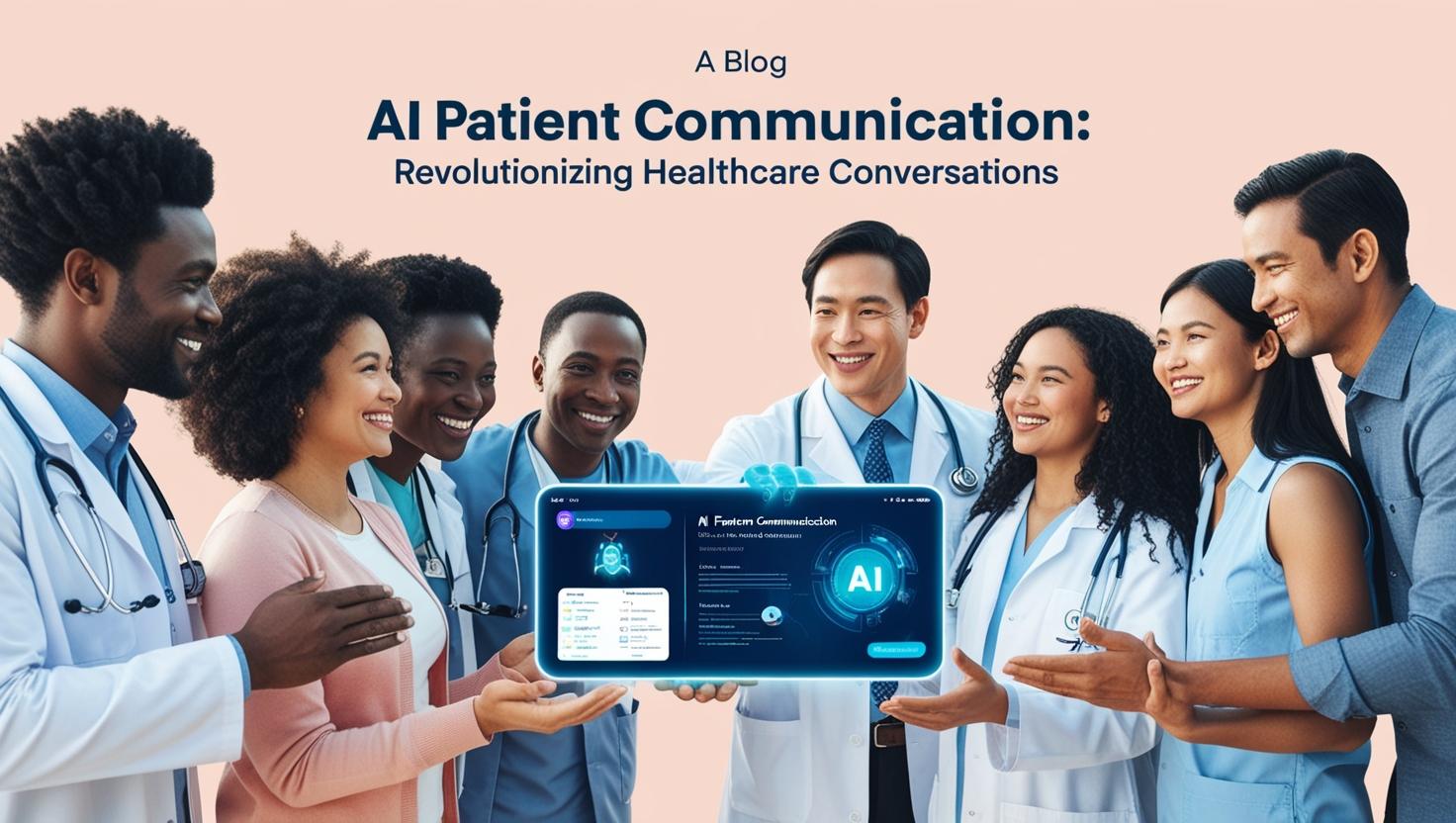AI Patient Communication: Revolutionizing Healthcare Conversations
AI is changing how healthcare providers communicate with patients through AI patient communication. It streamlines routine tasks, offers personalized support, and improves overall patient satisfaction. This article explores AI’s role in healthcare communication and its benefits for patient care.
Key Takeaways
- AI is transforming patient communication in healthcare by enhancing personalization and real-time support, improving satisfaction and engagement.
- Natural Language Processing simplifies complex medical information, making health literacy more accessible and fostering informed patient decision-making.
- The integration of AI tools can improve patient outcomes through continuous monitoring and tailored care plans, although challenges regarding privacy and accessibility must be addressed.
Enhancing Patient Communication with AI

AI is at the forefront of a revolution in healthcare communication, offering faster and more effective ways to manage patient interactions. The integration of AI technologies allows healthcare providers to handle routine patient messages efficiently, significantly improving overall communication quality. In an era where patients are more demanding than ever, the adoption of AI is not just a luxury but a necessity for future clinics to thrive. Streamlined communication strategies through AI lead to better patient satisfaction and engagement, enabling healthcare providers to meet rising patient expectations.
One of the most transformative aspects of AI in healthcare is its ability to provide real-time support and personalized interactions. AI-generated drafts assist physicians in delivering more empathetic and tailored patient care, as demonstrated by the effective use of AI at the University of California San Diego Health.
These generative artificial intelligence tools alleviate the workload on healthcare providers by handling routine communications, allowing doctors to focus on more complex patient care tasks. Further exploration into AI’s personalization of patient interactions and real-time support via AI chatbots will be provided.
Leveraging AI for Personalized Interactions
Personalization in healthcare communication is no longer a distant goal but a tangible reality, thanks to the power of artificial intelligence. By analyzing patient data, AI systems can tailor communications based on individual preferences and medical histories, ensuring that each interaction is meaningful and relevant. This level of personalization enhances patient engagement and fosters trust, as patients feel their unique needs are being understood and addressed through empathetic communication. Through the use of deep learning and generative AI, healthcare providers can craft thoughtful responses that resonate with patients, thereby improving the overall patient experience.
Moreover, the ability of AI to draft patient messages allows physicians to dedicate more time to direct patient care, rather than getting bogged down by administrative duties. It boosts healthcare delivery efficiency and enhances the quality of doctor-patient interactions, ultimately reducing physician workload.
Patients have reported a positive perception of AI-assisted physician responses, indicating a potential boost in patient satisfaction and trust in their healthcare providers. While AI enhances communication quality by creating detailed and empathetic responses, the human element remains indispensable, as physicians still play a crucial role in editing and finalizing these messages, ultimately shaping patient experiences.
Real-time Patient Support with AI Chatbots
AI chatbots are revolutionizing patient support by providing around-the-clock assistance, ensuring that patient queries are addressed promptly and efficiently. These virtual assistants not only monitor health conditions but also manage patient messages, reducing the cognitive burden on healthcare providers and allowing them to focus on more critical tasks. The ability of chatbots to scan patient messages and draft responses for non-emergency queries enhances the overall efficiency of healthcare interactions.
AI chatbots enhance patient care by offering instant feedback and accessible responses to patient queries. This immediate feedback mechanism enhances patient satisfaction and engagement, as patients feel their concerns are being heard and addressed without delay.
Reducing the need for patient calls, AI chatbots allow healthcare providers to manage routine interactions more effectively, optimizing patient communication and care.
Simplifying Health Information for Patients

One of the critical challenges in healthcare is ensuring that patients fully understand their medical information. AI steps in to bridge this gap by simplifying complex medical details, thereby improving health literacy and patient understanding. When patients can easily grasp their health information, they are better equipped to make informed decisions about their care, leading to improved health outcomes.
Exploration includes AI’s use of natural language processing (NLP) to clarify medical terms and AI-driven patient education materials tailored to individual needs.
The simplification of medical information through AI not only enhances patient comprehension but also makes healthcare communication more accessible and less intimidating. Health systems that utilize AI to break down complex medical concepts into simpler terms find that how beneficial patients can navigate their medical details with greater ease and confidence.
Enhancing the accessibility of health information, AI fosters improved patient engagement and satisfaction.
Using Natural Language Processing to Clarify Medical Terms
Natural Language Processing (NLP) is a powerful tool that effectively converts technical medical human language into simpler terms, making it easier for patients to understand their health conditions and treatment plans. By transforming complex medical jargon into plain, easy-to-understand language, NLP reduces the cognitive burden on patients and enhances their overall comprehension. This not only improves patient satisfaction but also ensures that patients are better informed about their healthcare decisions.
NLP enables healthcare providers to answer patient questions more effectively, ensuring clear and comprehensible responses. The ability to translate complicated medical concepts into layman’s terms enhances the quality of doctor-patient communication and fosters a more transparent and trusting relationship.
The ongoing evolution of AI will see NLP playing a pivotal role in enhancing patient understanding and engagement in healthcare communication.
AI-driven Patient Education Materials
AI-driven patient education tools are transforming the way patients learn about their health by offering tailored, interactive learning experiences that adapt to individual needs. These tools are particularly beneficial for patients with limited health literacy or language challenges, as they provide customized educational resources that cater to diverse patient needs. By generating individualized education content, AI enhances patient engagement and ensures that patients are better informed about their health conditions and treatment options.
AI-generated customized educational materials enhance the overall patient experience and lead to improved health outcomes. Catering to unique learning styles, AI-driven patient education materials provide information in the most effective format for each patient. This tailored approach not only improves patient understanding but also fosters a more proactive attitude towards health management.
Improving Patient Outcomes with AI

Artificial intelligence is revolutionizing patient care by leveraging large datasets to enhance diagnostic precision, foresee health complications, and facilitate timely interventions. By enabling earlier disease detection and improved survival rates, AI significantly boosts patient outcomes and reduces hospital readmissions. The ability of AI to provide data-driven insights ensures that healthcare providers can make informed decisions that enhance patient care and health outcomes.
The transformative impact of AI on healthcare delivery extends to predictive analytics, which can foresee potential health complications and enable preventive care measures. Delving into the continuous monitoring of patient progress and chronic condition management by AI tools, this section highlights AI’s pivotal role in improving patient outcomes and satisfaction.
Monitoring Patient Progress with AI Tools
AI tools are revolutionizing patient care by enabling continuous monitoring of patient data, providing healthcare professionals with real-time insights for informed decision-making using artificial intelligence systems.
These tools can:
- Track patient data trends
- Alert healthcare providers about potential health deterioration before it becomes critical
- Facilitate early interventions and timely care
The ability to continuously monitor patient progress ensures that healthcare providers can respond promptly to any changes in a patient’s condition, thereby improving overall patient health and satisfaction.
AI tools analyze patient data trends to identify potential complications in chronic patients, enabling proactive care measures and personalized treatment adjustments. This continuous monitoring not only enhances patient outcomes but also reduces the need for hospital readmissions, ensuring that patients receive the best possible care in a timely manner.
AI in Chronic Condition Management
Managing chronic conditions is a complex and ongoing process that requires continuous monitoring and tailored care plans. AI technology supports chronic disease management by developing personalized care plans based on ongoing health data and patient needs. By enabling remote monitoring, AI allows patients to share their health metrics instantly with healthcare providers, ensuring that any changes in their condition are promptly addressed.
AI aids in developing tailored care plans for patients with chronic illnesses, enhancing the overall quality of patient care. These tools can flag important changes in patient conditions, enabling early interventions and personalized treatment adjustments that improve patient health outcomes.
The implementation of AI in chronic condition management leads to quicker diagnoses, better treatment options, and overall improved patient care.
Addressing HIPAA in AI Patient Communication

The integration of AI in healthcare communication brings about significant benefits but also raises challenges, particularly regarding data security and privacy.
Here are some key points to consider:
- HIPAA compliance is crucial for protecting patient data and maintaining trust in AI systems.
- Healthcare providers must adhere to strict data privacy standards and obtain HIPAA Business Associate Agreements (BAAs) to safeguard patient information.
- Addressing ethical concerns and ensuring data security are critical for AI’s successful implementation in patient communication.
This highlights the importance of balancing innovation with the need for privacy and security in health care.
Accessibility to AI tools is another important consideration, as disparities in access can lead to unequal healthcare outcomes. Exploration includes the importance of data security and privacy in AI patient communication, along with strategies to overcome accessibility barriers, ensuring all patients benefit from AI technologies.
Ensuring Data Security and Privacy
Healthcare providers prioritize the safeguarding of patient data. This is especially important when utilizing AI tools. Compliance with HIPAA regulations is essential to ensure data security and protect patient information. Establishing AI governance committees is essential. This process helps ensure ethical and technical compliance in AI implementation. An example of securing patient consent can be seen in UC San Diego Health’s strict data protocols, which ensure that patient information is handled with the utmost care and security.
Adhering to data privacy standards and obtaining HIPAA BAAs ensures patient data protection and responsible use of AI systems by healthcare providers. These measures not only safeguard patient information but also build trust in AI technologies, ensuring that patients feel confident in the security of their data.
Overcoming Accessibility Barriers
Ensuring that artificial intelligence tools are accessible to all patients is crucial for maximizing their benefits and promoting equitable healthcare outcomes. AI tools should consider factors such as language, digital skills, and economic background to enhance accessibility and ensure that all patients can utilize them effectively. Healthcare providers should regularly evaluate AI tools for bias and effectiveness, testing them with diverse groups to ensure fairness and inclusivity.
Addressing accessibility barriers ensures AI technologies are used to their full potential, benefiting all patients regardless of their background. This inclusive approach not only enhances patient engagement and satisfaction but also promotes fairness and equality in healthcare communication strategies.
Future Implications of AI in Healthcare Communication

Artificial intelligence integration in healthcare communication is in its early stages, making ongoing research essential to understand its long-term effects on patient satisfaction and healthcare outcomes. Preliminary research at UC San Diego Health indicates that AI can generate compassionate, detailed messages that ensure patients feel heard and understood. As AI continues to evolve, it holds the potential to alleviate cognitive burdens on healthcare providers, allowing them to focus more on complex care rather than administrative tasks.
However, the future of AI in healthcare communication is not without challenges. Ethical dilemmas regarding privacy, informed consent, and social justice must be addressed to ensure the responsible use of AI technologies. Further research is needed to fully understand the long-term impact of AI on patient satisfaction and healthcare outcomes, ensuring that AI integration benefits both patients and healthcare providers.
Summary
In summary, the integration of AI in healthcare communication is transforming patient interactions, simplifying medical information, and improving overall patient outcomes. From personalized interactions and real-time support with AI chatbots to the use of NLP and AI-driven patient education materials, AI is revolutionizing the way healthcare providers communicate with patients. By ensuring data security and overcoming accessibility barriers, healthcare providers can maximize the benefits of AI technologies, fostering a more inclusive and effective healthcare system.
As we look to the future, ongoing research and ethical considerations will be crucial in shaping the role of AI in healthcare communication. The potential for AI to enhance patient satisfaction, reduce cognitive burdens on healthcare providers, and improve health outcomes is immense. Embracing AI technologies with a focus on ethical and inclusive practices will pave the way for a brighter future in healthcare communication.
Frequently Asked Questions
How does AI enhance patient communication?
AI enhances patient communication by facilitating faster, real-time support and personalized interactions, ultimately improving the quality of communication and increasing patient satisfaction.
What role does Natural Language Processing (NLP) play in healthcare?
NLP plays a crucial role in healthcare by simplifying complex medical terminology, enhancing patient understanding of their health conditions and treatment plans, ultimately improving overall patient satisfaction.
How do AI chatbots benefit healthcare providers and patients?
AI chatbots enhance patient care and satisfaction by providing 24/7 support and managing queries efficiently, which also alleviates the workload of healthcare providers. This leads to more immediate feedback and accessible information for patients.
What measures are necessary to ensure data security and privacy in AI patient communication?
To ensure data security and privacy in AI patient communication, it is essential for healthcare providers to comply with HIPAA regulations, secure HIPAA Business Associate Agreements (BAAs), and establish AI governance committees. These measures not only protect patient data but also foster trust in AI technologies.
What are the future implications of AI in healthcare communication?
The future of AI in healthcare communication will significantly enhance patient satisfaction and health outcomes while alleviating the cognitive load on providers. Nevertheless, it is imperative to prioritize research and ethical considerations to ensure responsible implementation and long-term benefits.

